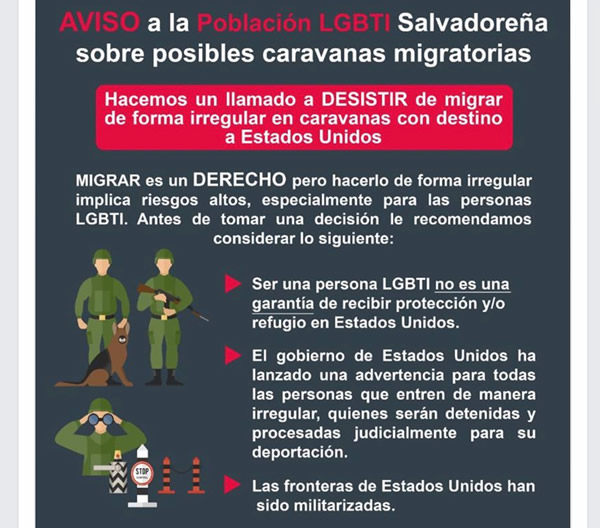News
Grupos LGBTI de El Salvador preocupados ante caravanas de migrantes
Organización trans emitió aviso el pasado mes


Grupos LGBTI en El Salvador han expresado su preocupación sobre los caravanas de migrantes. (Foto del Washington Blade por Michael K. Lavers)
“Ponte de acuerdo con las personas que participarán de esta caravana,” fue el mensaje que la página de Facebook publicó el 24 de octubre. “Comenta de dónde eres para que los demás sepan y sea más fácil para todos llegar en grupos.”
“Hay gente de todo el país,” añadió. “El Salvador emigra por un futuro mejor.”
Dicha página entró en funciones desde el 16 de octubre, administrada por una persona sin identificarse. Alenta a personas que querían salir del país a crear y unirse a grupos de redes sociales para enterarse así de los grupos cercanos que se unirían a dicha caravana y así salir con ellos.
Esta situación comenzó a preocupar a diferentes personas y organizaciones de la sociedad civil, entre ellas las organizaciones LGBTI que conforman la Federación Salvadoreña LGBTI. COMCAVIS Trans tomó la iniciativa de publicar un aviso de advertencia para la población LGBTI.
“MIGRAR es un DERECHO pero hacerlo de forma irregular implica riesgos altos, especialmente para las personas LGBTI,” lea el aviso de COMCAVIS Trans en su página de Facebook.
“Algunas de las personas LGBTI viajan por mejorar sus condiciones económicas, ya que en El Salvador existe una discriminación evidente al acceso de trabajo para muchas de las personas LGBTI, especialmente para las mujeres transgénero, existe mucha inseguridad a su integridad física, asedio por pandillas, tratos crueles y abuso de autoridad por parte de policías, soldados,” comenta al Washington Blade Bianca Rodríguez, directora ejecutiva de COMCAVIS Trans.
Entre los enunciados del aviso mencionaban que ser una persona LGBTI no es garantía de recibir y/o refugio en los EEUU, a la vez hacían énfasis que el gobierno estadounidense ha lanzado una advertencia para todas las personas que entren de manera irregular, que serán detenidas y procesadas judicialmente para su deportación.
Por otro lado, Liduvina Magarin, viceministra del Ministerio de Relaciones Exteriores, declaró que brindarían “acompañamiento” al grupo de salvadoreños migrantes, con el único objetivo de que las familias salvadoreñas se informen, tomen una decisión responsable y no pongan en riesgo la vida de los niños y niñas en la ruta migratoria.
Pero el 31 de octubre se concentró otro número de personas en el mismo lugar para conformar una segunda caravana, con el mismo objetivo de buscar un futuro mejor para sus familias.
“Si normalmente corremos peligro en nuestro diario vivir, en las caravanas de arriesga el triple y no solo son o serán violentados en las fronteras por las autoridades o la delincuencia, sino también por los mismos que forman las caravanas,” comentó al Blade Aldo Peña de Hombres Trans HT.
“Yo no me iría para posiblemente morir en el camino, además que recuerden que en este país dejan a sus familias, y ellos seguirán viviendo las injusticias de este país,” agrega Peña.

COMCAVIS Trans ha emitido un aviso que insta a los migrantes LGBTI a no viajan a los EEUU con caravanas de migrantes.
Por su parte Camila Portillo, una activista trans, comenta al Blade que “no hay que detener el sueño de emigrar por un mejor futuro, si por ejemplo el Estado y el país no garantiza el desarrollo socio económico de la población LGBTI.”
“Práctica no se ejecutan de la forma correcta, aunque hayan personas en la disposición de apoyar a las personas LGBTI,” ella dijo.
“Acá hay mucho desplazamiento forzado internamente, por el tema de la violencia, así que no creo que sea una moda,” Portillo comenta al Blade. “Es más que todo una cuestión estructural de que el Estado no garantiza no solo a la población LGBTI sino a la población en general, pero que por ser una población en riesgo es más vulnerada, por eso el estado debe garantizar el bienestar de las personas.”
Portillo no pierde la esperanza que en los países donde pasen las caravanas logren tener la ayuda que necesitan y poder cumplir sus objetivos sin tener muchos obstáculos, que el Estado salvadoreño debe comenzar a depurar sus mismas estructuras llenas de corrupción, que hacen valer decretos y diferentes lineamientos que se han creado a favor de la población LGBTI, no solo tener todo por escrito, sino comenzar a ejecutarlo.
En la Declaración Universal de los Derechos Humanos en sus artículos 13 y 14 reivindica expresa que las personas tienen derecho a moverse libremente e incluso a buscar refugio y asilo en casos extremos donde su vida corre peligro.
“Ante los altos índices de violencia en El Salvador muchas de las personas que integran esa caravana tendrán sus propios motivos para migrar,” expresó Rodríguez. “Pero ante esta situación el Estado salvadoreño por lo menos debería coordinar con instituciones nacionales y asociaciones y organismos internacionales para brindar una protección durante su recorrido, que incluso los países que ellos transitan hacia EEUU (Guatemala, México) proteja sus derechos humanos.”
Al cierre de esta nota las personas de la primera caravana ya se encontraban en tierras mexicanas, en donde se les dio albergue a las familias para que pudieran mantenerse juntas. También recibieron asistencia médica, alimentos, baños y regaderas.
United Nations
UN Human Rights Council extends LGBTQ rights expert’s mandate
29 countries voted for resolution

The U.N. Human Rights Council on Monday extended the mandate of the United Nations’ independent LGBTQ rights expert for another three years.
The resolution passed with 29 countries (Albania, Belgium, Bolivia, Brazil, Bulgaria, Chile, Colombia, Costa Rica, Cuba, Cyprus, the Czech Republic, the Dominican Republic, France, Georgia, Germany, Iceland, Japan, Kenya, the Marshall Islands, Mexico, the Netherlands, North Macedonia, South Korea, Romania, South Africa, Spain, Switzerland, Thailand, and Vietnam) voting for it and 15 countries (Algeria, Bangladesh, Burundi, China, Cote d’Ivoire, Democratic Republic of Congo, Ethiopia, Gambia, Indonesia, Kuwait, Malawi, Maldives, Morocco, Qatar, and Sudan) voted against it.
Benin, Ghana, and Kyrgyzstan abstained.
The U.S. in February withdrew from the Human Rights Council. The Trump-Pence administration in 2018 pulled the U.S. from it. The U.S. in 2021 regained a seat on the Human Rights Council.
Graeme Reid has been the UN’s independent LGBTQ rights expert since 2023. The South African activist, among other things, previously ran Human Rights Watch’s LGBT Rights Program.
Maryland
Maryland’s oldest rural gay bar — and one of the last — is a log cabin in the woods
The Lodge is a Boonsboro watering hole resembling a log cabin

By SAPNA BANSIL | In the woods of a conservative Western Maryland town of fewer than 4,000 people is an unlikely landmark of state LGBTQ history.
The Lodge, a Boonsboro watering hole that resembles a log cabin, is Maryland’s oldest rural gay bar — one of a few remaining in the country, according to historians.
For about four decades, the Washington County venue has offered safety, escape and community to queer people far from large, liberal cities. Starting Friday night, The Lodge will close out Pride month with one of its biggest parties of the year: a weekend of dancing, drinking and drag in celebration of Frederick Pride, held about 20 miles away in the area’s largest city.
The rest of this article the Baltimore Banner published on June 27 can be read on its website.

South Africa National Assembly Speaker Thoko Didiza on June 17 swore in lesbian feminist Palomino Jama as a new MP.
Jama joins other LGBTQ legislators — including Public Works and Infrastructure Minister Dean Macpherson; Forestry, Fisheries and the Environment Minister Dion George; and Deputy Women, Youth, and Persons with Disabilities Minister, Steve Letsike.
Jama said she will work hard and excel as MP.
“What a great moment to be alive. Thank you youth of 1976, thank you Simon Nkoli, Phumi Mthetwa, Paddy Nhlaphos, Vanessa Ludwig, and others for what you did for the LGBTI people in the 80s and 90s. Lastly, for the fierce fist of the Jamas to always hit where it matters for the people of this country,” said Letsike.
Embrace Diversity Movement, a local LGBTQ organization, said Jama’s inauguration came at an appropriate time, during Pride month.
“Her swearing-in took place during a month of profound significance in June, which marks both international Pride Month and Youth Month in South Africa,” said the group. “Palomino is a seasoned queer activist and dedicated community builder with a distinguished record of leadership and service.”
“The EDM proudly supports Palomino in her deployment to parliament, her presence meaningfully advances youth and queer representation in public office,” added the Embrace Diversity Movement. “We are confident that she will serve the people of South Africa with integrity, courage, and distinction.”
South Africa is the only African country that constitutionally upholds LGBTQ rights. There are, however, still myriad challenges the LGBTQ community faces on a daily basis that range from physical attacks to online abuse.
Letsike in May faced a barrage of online attacks after she released a scathing statement against popular podcaster Macgyver “MacG” Mukwevho, who during a podcast episode in April insinuated that the reason behind popular socialite Minnie Dlamini’s “unsuccessful” relationships were probably due to the bad odor from her genitals.
Letsike, who viewed MacG’s comments as offensive, called for the podcaster to be summoned before parliament’s Portfolio Committee on Women, Youth, and Persons with Disabilities and criticized the local television station that aired the podcast.
X users and other social media subscribers bombarded Letsike with anti-lesbian comments. She, however, was unphased.
Letsike continues to face anti-lesbian comments, even though MacG apologized and the television station on which his podcast had aired cancelled its contract with him.




















